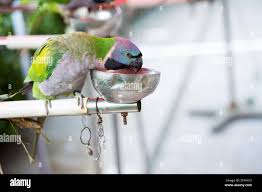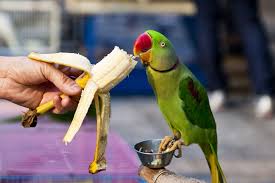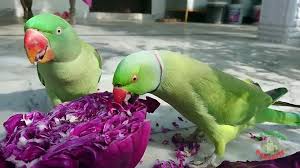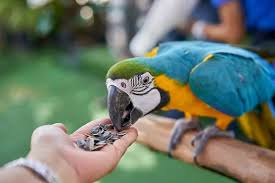 Feeding a pet bird is more than just filling a bowl with seeds. A healthy diet is the cornerstone of a bird’s overall wellbeing. Just like humans, birds need a mix of proteins, fats, vitamins, and minerals to thrive. An ideal diet varies from species to species, but there are some universal principles that apply across the board.
Feeding a pet bird is more than just filling a bowl with seeds. A healthy diet is the cornerstone of a bird’s overall wellbeing. Just like humans, birds need a mix of proteins, fats, vitamins, and minerals to thrive. An ideal diet varies from species to species, but there are some universal principles that apply across the board.
A balanced diet ensures that your bird has the energy to flit around its cage, the nutrients to grow strong feathers, and a robust immune system to fend off illnesses. Poor nutrition can lead to a host of problems like obesity, lethargy, feather plucking, and even shortened lifespans. It’s worth investing the time to understand what makes up a good diet for your feathered friend.
Birds can be a bit particular about their food. They sometimes pick out their favorite pieces, which means they might miss out on essential nutrients. A varied diet can help mitigate this problem. Include different types of food to keep things interesting and nutritionally balanced. From nuts to fruits and veggies to specially formulated pellets, each type of food plays a unique role in your bird’s health.
Don’t forget that water is also a crucial part of the diet. Clean, fresh water should always be available to prevent dehydration and help with digestion. Regularly check and refill the water to make sure it’s not contaminated with food or droppings.
Ultimately, your bird’s diet is a big part of its happiness and health. By understanding and providing the right mix of food, you’re setting your pet up for a vibrant and healthy life.
Nut Nutrition: A Powerhouse of Protein and Healthy Fats
Nuts are a fantastic source of protein and healthy fats, providing birds with the energy and nutrition they need for their active lifestyles. They’re a great addition to your bird’s diet but should be fed in moderation due to their high-fat content. Giving your bird the right type of nuts can make a significant difference in their health.
Almonds top the list with their vitamin E, fiber, and healthy fats. They’re perfect for promoting your bird’s skin and feather health. Just make sure to offer them in small, manageable pieces to prevent choking.
Walnuts are another excellent choice. Packed with omega-3 fatty acids, they can support your bird’s heart health. Their unique texture also adds a bit of fun for your bird to crack open and eat.
Pistachios offer a good mix of protein, potassium, and iron. Birds love their taste, and the nutrients in pistachios can aid in muscle maintenance and oxygen transport in the blood.
However, steer clear of peanuts. Although they might seem like an easy snack, peanuts can harbor harmful mold that produces aflatoxin, which is dangerous to birds. It’s better to stick with safer nut options like almonds, walnuts, and pistachios.
When feeding nuts, remember that balance is key. Too much fat can lead to obesity and related health issues. Nuts should only be a part of a varied and balanced diet. By being mindful of the types and amounts of nuts you offer, you can keep your bird both happy and healthy.
Fruits: Nature’s Vitamin Boosters
Fruits are not just delicious snacks; they’re packed with essential vitamins, minerals, and antioxidants that contribute to your bird’s overall health. Including fruits in your bird’s diet can support their immune system, improve feather quality, and provide much-needed hydration, especially in warmer months.
Apples are a go-to fruit for many bird owners. They contain vitamin C and fiber, which are beneficial for digestion. However, always remove the seeds since they contain compounds that can be toxic to birds.
Berries, such as blueberries, strawberries, and raspberries, are tiny powerhouses of antioxidants. These fruits help boost the immune system and can be a delightful treat for your bird. They’re also low in sugar, making them a healthier option.
Mangoes are another excellent choice. They’re rich in vitamins A and C, both of which are vital for maintaining healthy feathers and overall vitality. Offering small pieces of mango can be a great way to add variety and appeal to your bird’s diet.
 Always be cautious about the types of fruits you offer. Avocados, for instance, are a big no-no; they’re toxic to birds, so avoid them at all costs. Moderation is also crucial, as fruits can be high in sugar. A few small pieces throughout the week should suffice.
Always be cautious about the types of fruits you offer. Avocados, for instance, are a big no-no; they’re toxic to birds, so avoid them at all costs. Moderation is also crucial, as fruits can be high in sugar. A few small pieces throughout the week should suffice.
By incorporating a variety of fruits into your bird’s diet, you’re not just treating them to tasty snacks but also boosting their health, making them more vibrant and energetic.
Vegetables: Essential Greens for Optimal Health
Vegetables are an indispensable part of your bird’s diet, providing them with essential vitamins, minerals, and fiber. These nutrient-rich foods help keep your bird’s digestive system running smoothly and support overall health.
Broccoli is a fantastic choice, packed with vitamin C and fiber. It can boost your bird’s immune system and make mealtime interesting with its unique texture. Remember to chop it into small, manageable pieces to make it easier for your bird to eat.
Carrots are another great option. They are loaded with vitamin A, which is crucial for maintaining good eyesight. Offering grated or thinly sliced carrots can add a splash of color and nutrition to your bird’s meal.
Kale is a leafy green that’s loaded with antioxidants. These help fight off free radicals and keep your bird’s immune system in top shape. Make sure to wash and chop the kale into tiny, bird-friendly pieces.
While vegetables are incredibly beneficial, it’s important to prepare them correctly. Wash them thoroughly to remove any pesticides and chop them into small pieces to prevent choking hazards. Avoid feeding onions, garlic, and mushrooms as they can be harmful to birds.
Offering a variety of vegetables ensures your bird gets a wide range of nutrients, keeping them vibrant, active, and healthy. Just like humans, birds appreciate variety in their diet, and veggies are an easy way to provide that.
Pellets and Conclusion: The Foundation of a Balanced Diet
Pellets are an essential part of any bird’s diet, offering a complete and balanced nutrition profile. Designed to meet all the dietary needs of your bird, pellets take the guesswork out of feeding and ensure your bird gets the right mix of vitamins, minerals, and proteins.
Gradually introducing pellets can help avoid digestive issues. Start by mixing pellets with your bird’s favorite foods and slowly increase the pellet proportion over time. This makes the transition smoother and helps your bird get accustomed to the new food without any stress.
Apart from pellets, a mix of nuts, fruits, and vegetables is crucial for a well-rounded diet. It’s all about achieving balance—each food type brings something unique to the table, whether it’s protein from nuts, vitamins from fruits, or fiber from vegetables.
Research is your best friend when it comes to your bird’s diet. Different species have different nutritional needs. Consulting with your avian veterinarian will help tailor a diet that’s specific to your pet’s requirements and lifestyle.
Quality pet bird food options, like those available at Squawk Box, can also simplify feeding by providing nutritionally balanced and convenient choices. Investing in high-quality bird food can significantly impact your bird’s health and lifespan.
By understanding and implementing a balanced diet rich in nuts, fruits, vegetables, and pellets, you’re setting your feathered friend up for a vibrant, healthy life. A happy, healthy bird is a testament to thoughtful, informed feeding.

